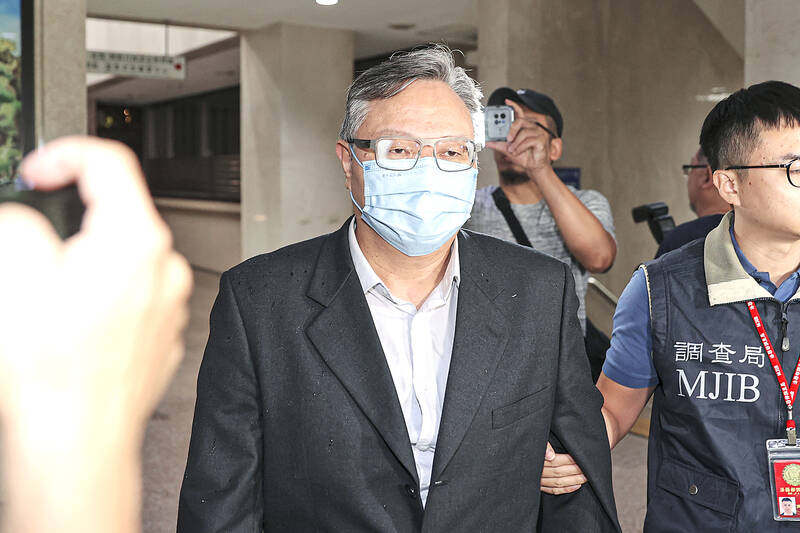Four people suspected of aggravated fraud and abusing public power for personal profit in a controversial egg import case were released on bail early yesterday morning, but were barred from leaving the country.
Chin Yu-chiao (秦語喬), head of Ultra Source (超思有限公司); Lin I-lung (林宜龍), head of Brilliance Biotechnology Ltd (亮采生物科技有限公司); Wu Chun-ta (吳俊達), then a specialist at the government-funded National Animal Industry Foundation; and Lin Chang-hsien (林昌憲), an employee at Brilliance Biotechnology, were released on bail of NT$2 million (US$62,814), NT$1 million, NT$500,000 and NT$300,000 respectively.
Four other suspects — then-foundation chief executive officer and Ministry of Agriculture official Chen Chung-hsing (陳中興), then-foundation supervisor Kung Jung-tai (龔榮太), Brilliance Biotechnology executive Wang Chao-hui (王朝輝) and a man surnamed Pang (龐) — were questioned, but released without bail.

Photo: CNA
The Taipei District Prosecutors’ Office raided 14 locations and summoned the eight suspects and three other witnesses for questioning on Tuesday night.
Another person closely tied to the case, Wu Yu-fei (吳諭非), was summoned for questioning, but did not show up. She is in Japan.
The case sparked controversy in 2022 and last year, because the companies involved in importing the eggs were not well-established in the field or seemingly in a position to handle large-volume imports, giving rise to allegations of corruption.
The foundation — a government watchdog — was entrusted in 2022 by the agriculture ministry with the urgent task of procuring eggs to deal with a shortage at the time, reports by the Control Yuan said.
The foundation contracted Brilliance Biotechnology to import eggs from Japan from March to May 2022. It also bought more than 25 million eggs from Ultra Source between August and November 2022 that the company had stocked after importing them from Japan, the reports said.
The foundation originally commissioned Wu Yu-fei, a food company representative and person familiar with trade with Japan, to coordinate the egg imports, and Wu specified Brilliance Biotechnology as the importer for the initial deal.
However, Chin, who is Wu Yu-fei’s mother, set up Ultra Source to handle sales of the eggs imported from Japan while Wu Yu-fei was collaborating with the foundation.
The Control Yuan said the foundation purchased the eggs from Ultra Source before the company was even registered.
It also accused the foundation of failing to check the quality and quantity of the eggs imported from Japan upon delivery, only filling out contract performance documents after the fact.
As for the unusually high prices of the imported eggs, the Control Yuan said the prices reported by Brilliance Biotechnology were about twice the cost of the eggs declared at customs.
In addition, the foundation made the purchase directly after only confirming the price over the telephone, without negotiations or setting a price range for the purchase, the Control Yuan said, adding that it has reported this to prosecutors.
Prosecutors provided few details related to the actual transactions and the specific actions that led to their suspicions of fraud.

A magnitude 7.0 earthquake struck off Yilan at 11:05pm yesterday, the Central Weather Administration (CWA) said. The epicenter was located at sea, about 32.3km east of Yilan County Hall, at a depth of 72.8km, CWA data showed There were no immediate reports of damage. The intensity of the quake, which gauges the actual effect of a seismic event, measured 4 in Yilan County area on Taiwan’s seven-tier intensity scale, the data showed. It measured 4 in other parts of eastern, northern and central Taiwan as well as Tainan, and 3 in Kaohsiung and Pingtung County, and 2 in Lienchiang and Penghu counties and 1

A car bomb killed a senior Russian general in southern Moscow yesterday morning, the latest high-profile army figure to be blown up in a blast that came just hours after Russian and Ukrainian delegates held separate talks in Miami on a plan to end the war. Kyiv has not commented on the incident, but Russian investigators said they were probing whether the blast was “linked” to “Ukrainian special forces.” The attack was similar to other assassinations of generals and pro-war figures that have either been claimed, or are widely believed to have been orchestrated, by Ukraine. Russian Lieutenant General Fanil Sarvarov, 56, head

FOREIGN INTERFERENCE: Beijing would likely intensify public opinion warfare in next year’s local elections to prevent Lai from getting re-elected, the ‘Yomiuri Shimbun’ said Internal documents from a Chinese artificial intelligence (AI) company indicated that China has been using the technology to intervene in foreign elections, including propaganda targeting Taiwan’s local elections next year and presidential elections in 2028, a Japanese newspaper reported yesterday. The Institute of National Security of Vanderbilt University obtained nearly 400 pages of documents from GoLaxy, a company with ties to the Chinese government, and found evidence that it had apparently deployed sophisticated, AI-driven propaganda campaigns in Hong Kong and Taiwan to shape public opinion, the Yomiuri Shimbun reported. GoLaxy provides insights, situation analysis and public opinion-shaping technology by conducting network surveillance

‘POLITICAL GAME’: DPP lawmakers said the motion would not meet the legislative threshold needed, and accused the KMT and the TPP of trivializing the Constitution The Legislative Yuan yesterday approved a motion to initiate impeachment proceedings against President William Lai (賴清德), saying he had undermined Taiwan’s constitutional order and democracy. The motion was approved 61-50 by lawmakers from the main opposition Chinese Nationalist Party (KMT) and the smaller Taiwan People’s Party (TPP), who together hold a legislative majority. Under the motion, a roll call vote for impeachment would be held on May 19 next year, after various hearings are held and Lai is given the chance to defend himself. The move came after Lai on Monday last week did not promulgate an amendment passed by the legislature that